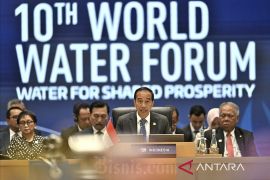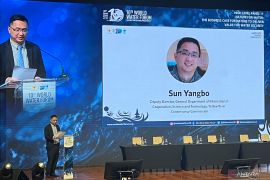Badung, Bali (ANTARA) - World Water Council (WWC) President Loic Fauchon said that finding solutions to water problems must be carried out simultaneously with efforts to overcome food and energy problems.
Speaking at the "Climate-Water-Energy-Food-Ecology System of Systems" session of the 10th World Water Forum in Bali on Thursday, he emphasized that water's impact goes beyond one sector. Effective water sustainability requires coordinated action from related sectors.
Fauchon also called water a political tool, saying that good governance is essential to ensuring that water is managed fairly and sustainably.
"Hence, beyond this cross-sectoral approach, it is imperative to have decision-making based on solid scientific data and responsibility in the use of water resources," Fauchon stated.
He remarked that solutions to water problems have so far only been addressed vertically within organizations. However, cross-sectoral solutions are also necessary. This, he said, could be a new vision for water sustainability in the future.
“What do we ultimately want? We want everyone in the world to have access not only to water but also to essential services," Fauchon pointed out.
"What are these essential services? It is water, it is electricity, and I say electricity and not only energy; access to electricity, food, health, and education at the very minimum," he added.
On the same occasion, Deputy Director General for Development Research of the International Water Management Institute (IWMI), Rachael McDonnell, stated that matters related to water play an important role across sectors, including food.
Baca juga: BNPT memastikan WWF Ke-10 berjalan lancar dan aman
Baca juga: Pertemuan Puan dan Jokowi di WWF Ke-10 bentuk keteladanan
Two major reports published by IWMI in 2021 and 2023 highlighted environmental damage, especially to water systems, due to practices in the food system. Hence, all parties must be involved in discussions and get involved to prevent the water crisis.
"We really do have to bridge that gap, bridge the political economies, and bridge those policies if we want to be able to do that on the food system side," she explained.










